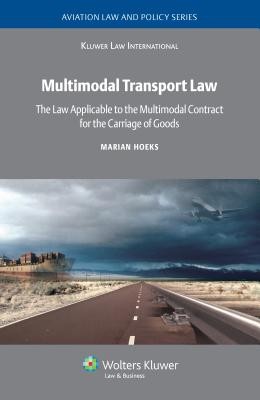
- We will send in 10–14 business days.
- Author: Marian Hoeks
- Publisher: Kluwer Law International
- Year: 2010
- Pages: 560
- ISBN-10: 9041132465
- ISBN-13: 9789041132468
- Format: 15.6 x 23.4 x 3 cm, hardcover
- Language: English
- SAVE -10% with code: EXTRA
Reviews
Description
Due to the fact that no attempt to create uniform law for multimodal carriage has as yet met with success, transport law has no adequate means to create certainty as to the legal consequences of any loss, damage or delay of cargo resulting from multimodal carriage contracts. A fragmented, complex and inconsistent liability patchwork - which involves regional, subregional and national laws usually focused on unimodal transport, supplemented by contractual standard rules created by the industry - serves as an international liability framework. The consequence of this state of affairs is that the applicable liability rules vary greatly from case to case and give rise to uncertainty concerning the extent of a multimodal carrier's liability in a given situation. Indeed, according to a 2003 UNCTAD survey, most parties involved in the transport industry do not consider the existing legal framework for multimodal transportation to be satisfactory or even cost-effective. Now, progressing through an in-depth analysis of the exact nature of the international multimodal carriage contract, this important study assesses how the most advantageous law applicable to a multimodal contract may be uncovered. Using the ideas, legislation and case law on multimodal carriage in the legal systems of Germany, The Netherlands and England to anchor her presentation, the author offers a thorough investigation of the existing framework of carriage law, the applicable rules of private international law, and the options provided by choice of law based on contractual conditions. In the course of the analysis all essential issues are scrutinized, including the following: - whether the modes of transport to be used may be left open by the contract; - time bars on protest and litigation and when they commence; - carriage documentation; - liability of the carrier for subcontractors; - planning for 'friction costs'; - rules on jurisdiction and the resulting forum shopping practice; - instances where conventions overlap, or when no existing carriage regime applies; - damage or loss that occurs at the point where one unimodal regime ends and another begins; - damage or loss brought about by multiple causes; and - rights and obligations attached to delivery. No comparable treatise exists on which rules may govern international multimodal contracts for the carriage of goods and under what conditions they will do so, and this book is thus an indispensable asset to the work of any practitioner or official connected with international transport. In addition, the author presents a detailed review of the various drafts and propositions that have been on offer in recent years, and submits a well-thought-out proposal for a set of multimodal transport rules to alleviate the difficulties that currently plague this area of carriage law.
EXTRA 10 % discount with code: EXTRA
The promotion ends in 17d.20:58:32
The discount code is valid when purchasing from 10 €. Discounts do not stack.
- Author: Marian Hoeks
- Publisher: Kluwer Law International
- Year: 2010
- Pages: 560
- ISBN-10: 9041132465
- ISBN-13: 9789041132468
- Format: 15.6 x 23.4 x 3 cm, hardcover
- Language: English English
Due to the fact that no attempt to create uniform law for multimodal carriage has as yet met with success, transport law has no adequate means to create certainty as to the legal consequences of any loss, damage or delay of cargo resulting from multimodal carriage contracts. A fragmented, complex and inconsistent liability patchwork - which involves regional, subregional and national laws usually focused on unimodal transport, supplemented by contractual standard rules created by the industry - serves as an international liability framework. The consequence of this state of affairs is that the applicable liability rules vary greatly from case to case and give rise to uncertainty concerning the extent of a multimodal carrier's liability in a given situation. Indeed, according to a 2003 UNCTAD survey, most parties involved in the transport industry do not consider the existing legal framework for multimodal transportation to be satisfactory or even cost-effective. Now, progressing through an in-depth analysis of the exact nature of the international multimodal carriage contract, this important study assesses how the most advantageous law applicable to a multimodal contract may be uncovered. Using the ideas, legislation and case law on multimodal carriage in the legal systems of Germany, The Netherlands and England to anchor her presentation, the author offers a thorough investigation of the existing framework of carriage law, the applicable rules of private international law, and the options provided by choice of law based on contractual conditions. In the course of the analysis all essential issues are scrutinized, including the following: - whether the modes of transport to be used may be left open by the contract; - time bars on protest and litigation and when they commence; - carriage documentation; - liability of the carrier for subcontractors; - planning for 'friction costs'; - rules on jurisdiction and the resulting forum shopping practice; - instances where conventions overlap, or when no existing carriage regime applies; - damage or loss that occurs at the point where one unimodal regime ends and another begins; - damage or loss brought about by multiple causes; and - rights and obligations attached to delivery. No comparable treatise exists on which rules may govern international multimodal contracts for the carriage of goods and under what conditions they will do so, and this book is thus an indispensable asset to the work of any practitioner or official connected with international transport. In addition, the author presents a detailed review of the various drafts and propositions that have been on offer in recent years, and submits a well-thought-out proposal for a set of multimodal transport rules to alleviate the difficulties that currently plague this area of carriage law.


Reviews